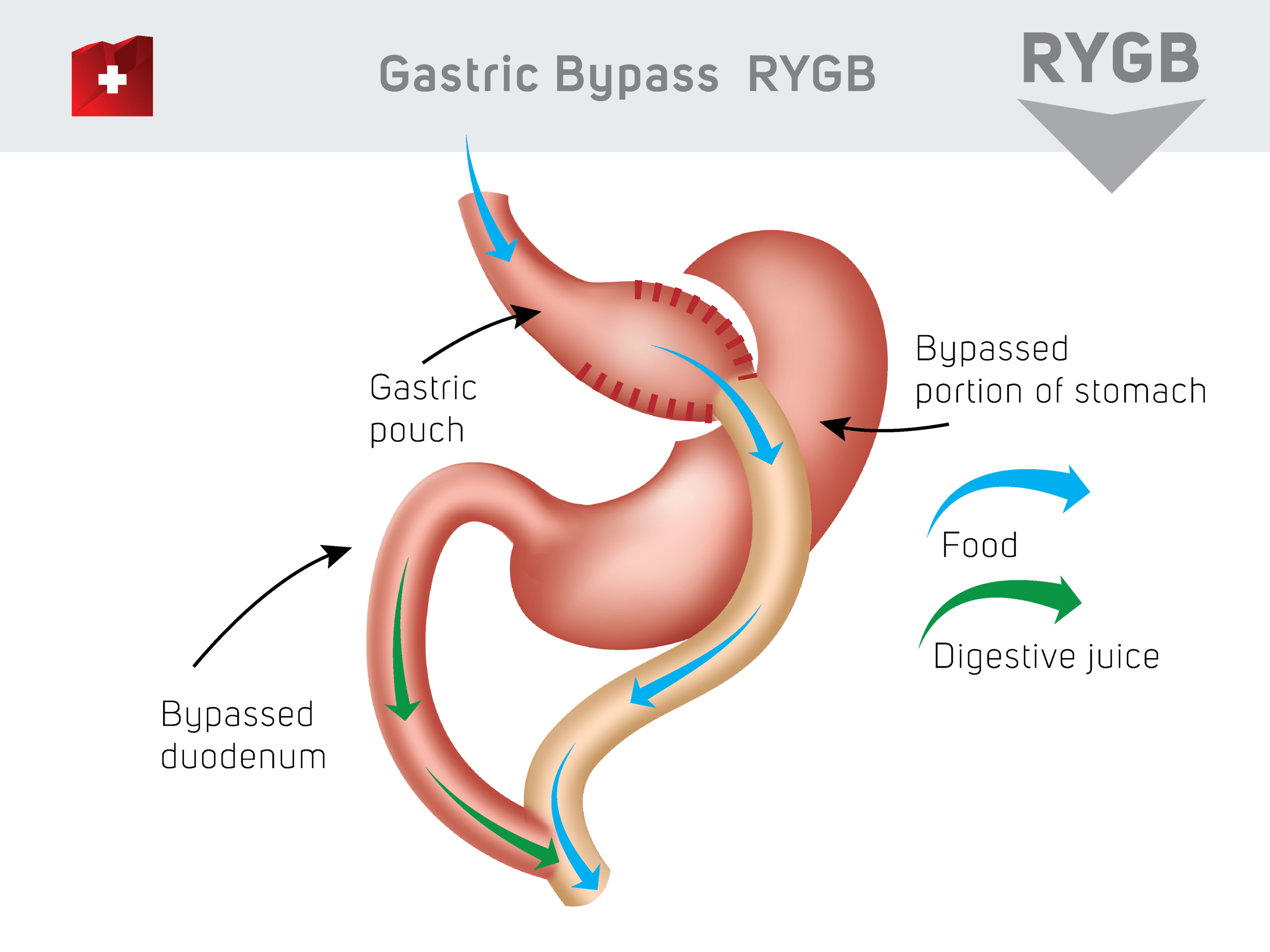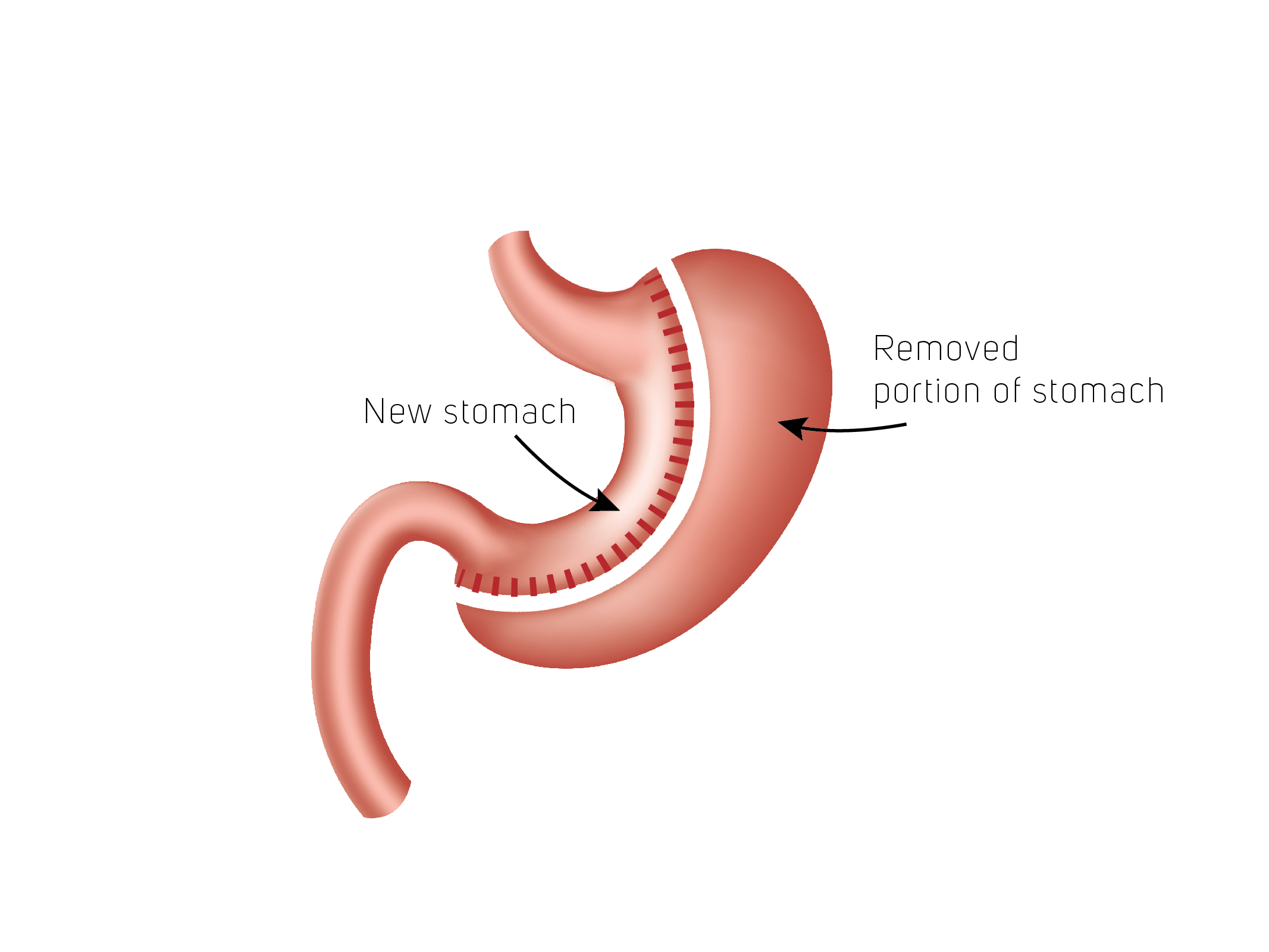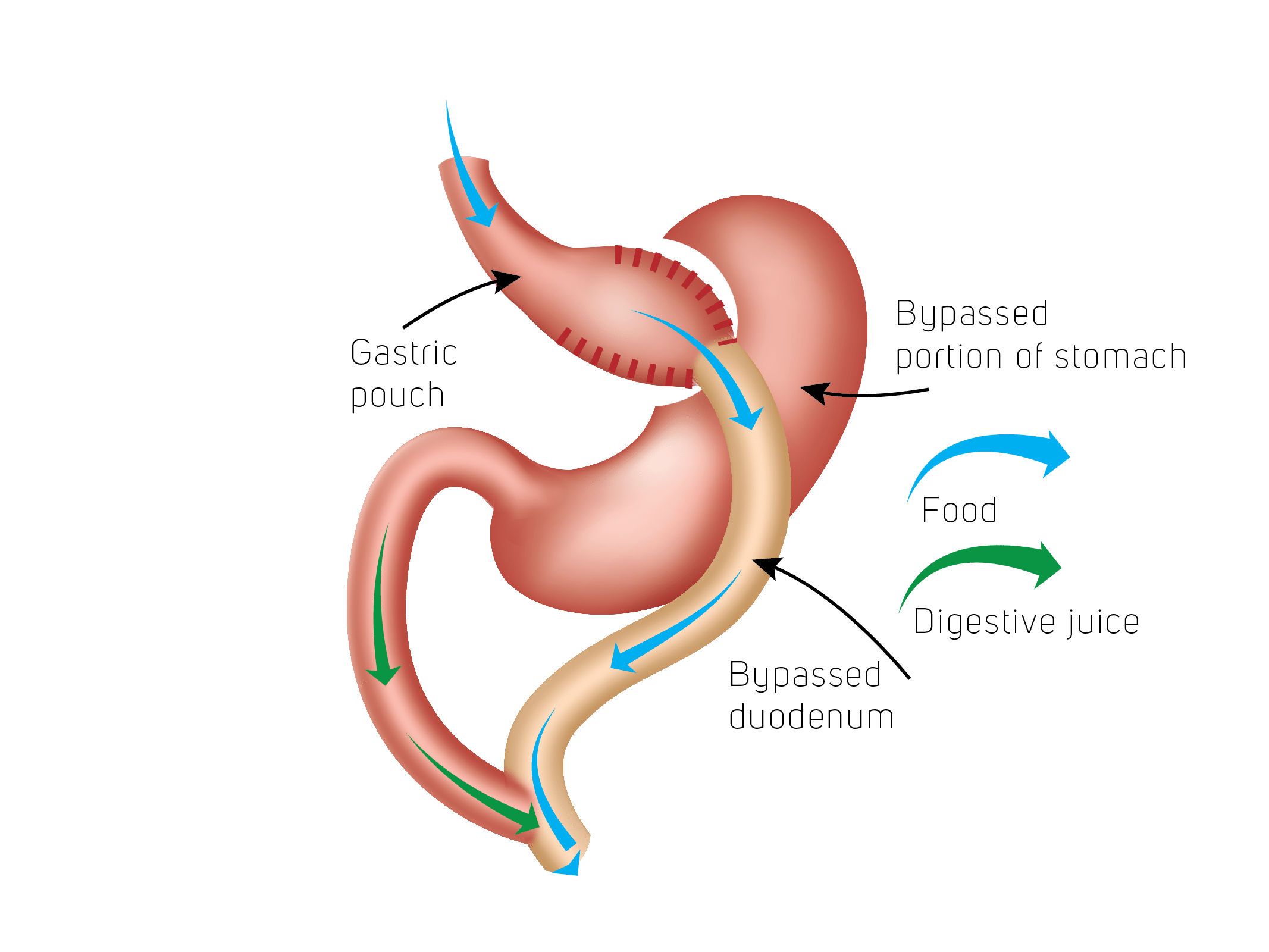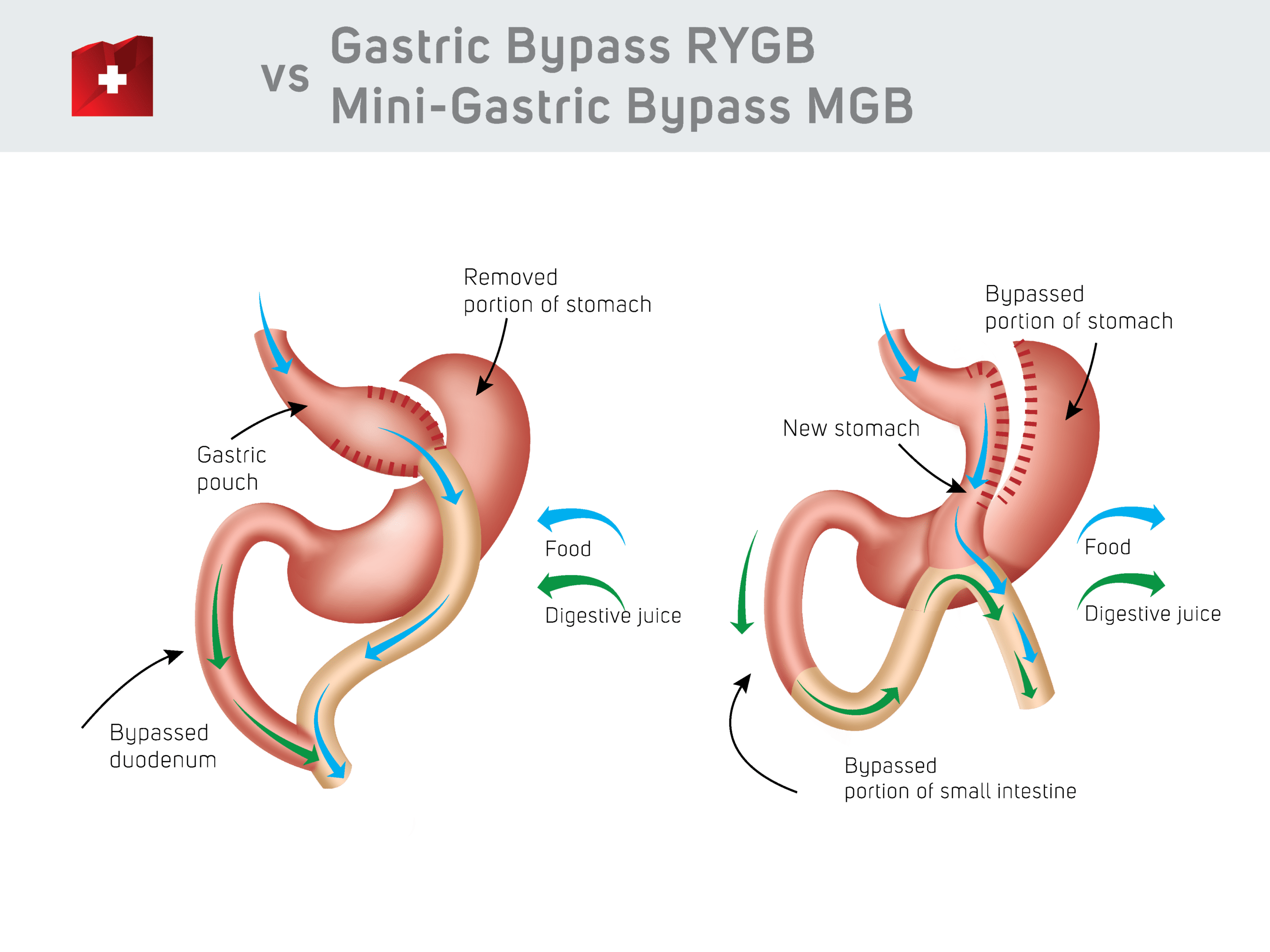Contact the coordinator
+48 75 645 2011
WhatsApp
+48 535 098 999

Contact the coordinator
+48 75 645 2011
WhatsApp
+48 535 098 999
Leave us a message
weightloss@kcmclinic.pl
Obesity is getting increasingly prevalent and becoming a global health concern. People are looking for effective solutions to lose weight and prevent the risks associated with obesity. One such popular solution is gastric bypass surgery, or Roux-en-Y gastric bypass (RYGB), which allows you to lose two-thirds of your excess weight within two years.
At KCM Clinic, we specialise in providing exceptional care and expertise in this life-changing procedure. With a team of experienced surgeons and a state-of-the-art facility, we are dedicated to helping our patients achieve significant and sustainable weight loss.
Gastric bypass surgery is a weight loss procedure that involves the restructuring of the stomach and small intestine. The primary objective is to limit the amount of food a person can consume and decrease nutrient absorption, promoting weight loss in individuals with obesity or obesity-related health issues. There are different types of gastric bypass procedures, with the Roux-en-Y gastric bypass being the most common.
Gastric bypass surgery is generally a safe and effective procedure for weight loss, but like any surgery, it comes with potential risks and complications. It’s important to be aware of these possibilities, and your consultant will thoroughly explain them to you before proceeding.
When to Seek Medical Attention
After surgery, it’s crucial to be vigilant and seek medical advice if experiencing:
Ensuring Your Safety
At KCM Clinic, your safety is the top priority. High standards of quality control, cleanliness, and rigorous training for medical teams are maintained to provide a secure and supportive environment throughout your gastric bypass surgery journey.
The cost of gastric bypass surgery in the UK can vary, with typical estimates ranging between £9,500 and £15,000. The financial aspect is an important consideration for individuals contemplating this procedure. KCM Clinic stands out with its competitive pricing. This transparent pricing structure aims to make this transformative surgery more accessible to those seeking effective weight loss solutions.
Your surgeon employs surgical staples to create a compact pouch at the upper section of your stomach, linking it to the lower part of your small intestine. As a result, the food you consume takes a direct route into your lower small intestine, bypassing the remainder of your stomach and the upper segment of your small intestine.
This surgical approach facilitates weight loss through three primary mechanisms:
The reduced size of your new stomach pouch limits the amount of food you can intake. This restriction naturally curtails your ability to consume as much as before, promoting a sense of fullness with smaller meals.
By rerouting the digestive path, fewer calories are absorbed as your food encounters a smaller portion of your small intestine. This intentional malabsorption contributes to the overall calorie deficit, a key factor in achieving weight loss goals.
The procedure acts as a deterrent to excessive sugar consumption. If you indulge in large amounts of sugar, your body responds by producing an excess of insulin. This can lead to an unpleasant phenomenon known as ‘dumping syndrome,’ characterized by symptoms like lightheadedness and nausea. As a result, there is a natural inclination to avoid excessive sugar intake.
In essence, gastric bypass surgery is a multifaceted approach that combines restriction, malabsorption, and a built-in deterrent to foster effective and sustained weight loss. This intricate process, orchestrated by the surgical staples and reconfiguration of the digestive system, serves as a powerful tool in helping individuals achieve their weight loss objectives.
Embarking on the path of gastric bypass surgery involves careful preparation, a skilled medical team, and a commitment to postoperative recovery. We’ll provide an in-depth overview of what to expect during gastric bypass surgery, including the key players in your medical team, the preoperative process, the surgery itself, and the postoperative care.
Alongside your bariatric surgeon, several healthcare professionals will play crucial roles in your gastric bypass journey:
Before the surgery, a thorough assessment will be conducted to ensure your fitness for the operation. This may involve blood tests, X-rays, and scans. Your bariatric surgeon will explain the surgery and discuss the long-term outlook. Weight loss and adherence to a specific diet, low in carbohydrates and fats, may be advised to reduce the size of your liver, facilitating keyhole surgery.
You’ll be admitted to the hospital either the day before or on the day of the procedure. Fasting for several hours is required, but clear liquids can be consumed until two hours before the operation. If any medication adjustments are necessary, your doctor will provide guidance. This pre-surgery period is an opportunity to address questions and concerns.
Gastric bypass is a major operation performed under general anesthesia. Typically conducted through laparoscopic (keyhole) surgery, your surgeon will make small incisions, use a camera and instruments, and employ surgical staples to create a walnut-sized pouch at the top of your stomach. The small intestine is then rearranged to achieve the desired bypass. The procedure generally takes between one and three hours.
Post-surgery, some discomfort is normal, and you’ll be provided with pain relief. The hospital stay usually ranges from two to five nights, during which compression stockings or blood-thinning medication may be prescribed to reduce the risk of complications. Your release will be contingent on completing a normal swallow test and initiating your diet plan.
Having someone to drive you home and stay with you for a few days post-surgery can be beneficial during the initial recovery period.
At KCM clinic, we provide all required diagnostic tests and consultations with specialist Doctors as part of our medical package to patients, so you don’t have to worry about additional costs resulting in high gastric bypass cost abroad. In addition to the above tests, you will be required to follow a special pre-operative diet in the week preceding the surgery.
This pre-operative diet helps reduce your stomach and liver volume for a more comfortable surgery and recovery (post surgery rehabilitation). The diet is strictly for the week before surgery and should be stopped immediately after the operation.
The pre-surgery weight loss diet is essential because it is low in fat and carbohydrate content, helping reduce your glycogen levels. Glycogen is an energy-giving sugar variant stored in the liver. For best results, you avoid heavy meals in the week preceding your surgery to avoid a reduction in the operative diet’s efficacy.
In addition to special diets, the following guidelines help prepare you for gastric bypass surgery:
Recovering from gastric bypass surgery is a gradual process that involves both physical and lifestyle adjustments. We’ll help you to explore the recovery timeline, aftercare procedures, ongoing treatment, and potential side effects, providing insights to help you navigate this transformative journey.
You can anticipate a return to your normal activities around six weeks after following a controlled diet. However, the initial months post-surgery may bring changes as your body adapts to rapid weight loss. These changes may include aches, tiredness, dry skin, feeling cold, thinning hair, and mood fluctuations. Over the first three to six months, these symptoms tend to diminish, with significant weight loss typically occurring around two years after surgery.
Your recovery care involves comprehensive elements, including:
Yes, your stomach can grow back even after getting a gastric bypass. This is because your stomach is built to accommodate your food intake. All you have to do is return to old feeding habits to increase or stretch your stomach after bariatric surgery.
Poland is one of the few European countries where you can get gastric bypass done at affordable prices. KCM Clinic offers affordable gastric bypass surgery (bariatric surgery) packages to both local and international patients. Most Patients choose to come to UK for the Gastric Bypass.
Gastric Bypass Surgery in UK costs varies and may be anywhere between €5500 to €6500. This fee covers consultation, hospital stay, pre-surgical tests, surgery fees, and anaesthetics. It does not include the costs of accommodation in the Hotel before Hospital admission and after hospital discharge and the airport pickup fees.
Your surgeon employs surgical staples to create a compact pouch at the upper section of your stomach, linking it to the lower part of your small intestine. As a result, the food you consume takes a direct route into your lower small intestine, bypassing the remainder of your stomach and the upper segment of your small intestine.
This surgical approach facilitates weight loss through three primary mechanisms:
The reduced size of your new stomach pouch limits the amount of food you can intake. This restriction naturally curtails your ability to consume as much as before, promoting a sense of fullness with smaller meals.
By rerouting the digestive path, fewer calories are absorbed as your food encounters a smaller portion of your small intestine. This intentional malabsorption contributes to the overall calorie deficit, a key factor in achieving weight loss goals.
The procedure acts as a deterrent to excessive sugar consumption. If you indulge in large amounts of sugar, your body responds by producing an excess of insulin. This can lead to an unpleasant phenomenon known as ‘dumping syndrome,’ characterized by symptoms like lightheadedness and nausea. As a result, there is a natural inclination to avoid excessive sugar intake.
In essence, gastric bypass surgery is a multifaceted approach that combines restriction, malabsorption, and a built-in deterrent to foster effective and sustained weight loss. This intricate process, orchestrated by the surgical staples and reconfiguration of the digestive system, serves as a powerful tool in helping individuals achieve their weight loss objectives.
Embarking on the path of gastric bypass surgery involves careful preparation, a skilled medical team, and a commitment to postoperative recovery. We’ll provide an in-depth overview of what to expect during gastric bypass surgery, including the key players in your medical team, the preoperative process, the surgery itself, and the postoperative care.
Alongside your bariatric surgeon, several healthcare professionals will play crucial roles in your gastric bypass journey:
Before the surgery, a thorough assessment will be conducted to ensure your fitness for the operation. This may involve blood tests, X-rays, and scans. Your bariatric surgeon will explain the surgery and discuss the long-term outlook. Weight loss and adherence to a specific diet, low in carbohydrates and fats, may be advised to reduce the size of your liver, facilitating keyhole surgery.
You’ll be admitted to the hospital either the day before or on the day of the procedure. Fasting for several hours is required, but clear liquids can be consumed until two hours before the operation. If any medication adjustments are necessary, your doctor will provide guidance. This pre-surgery period is an opportunity to address questions and concerns.
Gastric bypass is a major operation performed under general anesthesia. Typically conducted through laparoscopic (keyhole) surgery, your surgeon will make small incisions, use a camera and instruments, and employ surgical staples to create a walnut-sized pouch at the top of your stomach. The small intestine is then rearranged to achieve the desired bypass. The procedure generally takes between one and three hours.
Post-surgery, some discomfort is normal, and you’ll be provided with pain relief. The hospital stay usually ranges from two to five nights, during which compression stockings or blood-thinning medication may be prescribed to reduce the risk of complications. Your release will be contingent on completing a normal swallow test and initiating your diet plan.
Having someone to drive you home and stay with you for a few days post-surgery can be beneficial during the initial recovery period.
At KCM clinic, we provide all required diagnostic tests and consultations with specialist Doctors as part of our medical package to patients, so you don’t have to worry about additional costs resulting in high gastric bypass cost abroad. In addition to the above tests, you will be required to follow a special pre-operative diet in the week preceding the surgery.
This pre-operative diet helps reduce your stomach and liver volume for a more comfortable surgery and recovery (post surgery rehabilitation). The diet is strictly for the week before surgery and should be stopped immediately after the operation.
The pre-surgery weight loss diet is essential because it is low in fat and carbohydrate content, helping reduce your glycogen levels. Glycogen is an energy-giving sugar variant stored in the liver. For best results, you avoid heavy meals in the week preceding your surgery to avoid a reduction in the operative diet’s efficacy.
In addition to special diets, the following guidelines help prepare you for gastric bypass surgery:
Recovering from gastric bypass surgery is a gradual process that involves both physical and lifestyle adjustments. We’ll help you to explore the recovery timeline, aftercare procedures, ongoing treatment, and potential side effects, providing insights to help you navigate this transformative journey.
You can anticipate a return to your normal activities around six weeks after following a controlled diet. However, the initial months post-surgery may bring changes as your body adapts to rapid weight loss. These changes may include aches, tiredness, dry skin, feeling cold, thinning hair, and mood fluctuations. Over the first three to six months, these symptoms tend to diminish, with significant weight loss typically occurring around two years after surgery.
Your recovery care involves comprehensive elements, including:
Yes, your stomach can grow back even after getting a gastric bypass. This is because your stomach is built to accommodate your food intake. All you have to do is return to old feeding habits to increase or stretch your stomach after bariatric surgery.
Poland is one of the few European countries where you can get gastric bypass done at affordable prices. KCM Clinic offers affordable gastric bypass surgery (bariatric surgery) packages to both local and international patients. Most Patients choose to come to UK for the Gastric Bypass.
Gastric Bypass Surgery in UK costs varies and may be anywhere between €5500 to €6500. This fee covers consultation, hospital stay, pre-surgical tests, surgery fees, and anaesthetics. It does not include the costs of accommodation in the Hotel before Hospital admission and after hospital discharge and the airport pickup fees.





Contact the coordinator
+48 75 645 2011
WhatsApp
+48 535 098 999
Leave us a message
weightloss@kcmclinic.pl
NON-INVASIVE TREATMENT OF OBESITY
Send Request
Register
Visits, hospital procedures
Bariatric Surgery Center
Plastic Surgery Center
Spine Surgery Center
Dental Clinic
OMEGA Imaging Diagnostic Center
Work hours
KCM Clinic Wrocław
Chat KCM Clinic
Locations
KCM Clinic Jelenia Góra
KCM Clinic Wrocław
Parking